
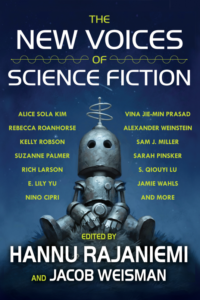 Title: The New Voices of Science Fiction by Hannu Rajaniemi, Jacob Weisman, Kelly Robson, Alice Sola Kim, Rich Larson, Sam J. Miller, Suzanne Palmer, Sarah Pinkser, E. Lily Yu, Rebecca Roanhorse, Alexander Weinstein, Vina Jie-Min Prasad, S. Qiouyi Lu, Nino Cipri, Jamie Wahls, Darcie Little Badger, Samantha Mills, David Erik Nelson, Jason Sanford, Amman Sabet, Lettie Prell, Amal El-Mohtar
Title: The New Voices of Science Fiction by Hannu Rajaniemi, Jacob Weisman, Kelly Robson, Alice Sola Kim, Rich Larson, Sam J. Miller, Suzanne Palmer, Sarah Pinkser, E. Lily Yu, Rebecca Roanhorse, Alexander Weinstein, Vina Jie-Min Prasad, S. Qiouyi Lu, Nino Cipri, Jamie Wahls, Darcie Little Badger, Samantha Mills, David Erik Nelson, Jason Sanford, Amman Sabet, Lettie Prell, Amal El-Mohtar Published by Tachyon Publications
Published: November 5th 2019
Genres: Science Fiction
Pages: 432
Format: ARC
Source: Netgalley
Goodreads
The New Voices of Science Fiction is an excellent companion to The New Voices of Fantasy published by Tachyon in 2017. So often genre is lumped together, especially science fiction and fantasy, but, just like me, if you enjoyed The New Voices of Fantasy, you will almost certainly enjoy The New Voices of Science Fiction. All of the stories included in this anthology were originally published or written within the last five or so years? Some of the names are unfamiliar to me, but a lot of these names have come to critical acclaim within those last five years, so it’s an excellent introduction if you’re also wondering where to begin with the genre. Yes, the entire SF genre. A lot of the older “classic” science fiction feels dated in tone, terminology, and technology and can at times feel intimidating for someone who may be unfamiliar with the genre, and this anthology elevates the newer voices we should be paying attention to. And yes, there are foundational genre works that act as cornerstones, but sometimes we have to smash the past and build something new.What would you do if your collective of tiny bots suddenly decide to mutiny? Would you find bioprinted steak delicious, even after it was signed by the artist? Is an 11 second attention-span long enough to bond with a cryogenically-revived tourist? Would you sell your native language to send your daughter to college?
The avant garde of science fiction has appeared, arriving via time machines and portals that may (or may not) work properly. In this space-age sequel to award-winning anthology, The New Voices of Fantasy, The New Voices of Science Fiction has launched the rising stars of the last five years of science fiction, including Rebecca Roanhorse, Amal El-Mohtar, Alice Sola Kim, Sam J. Miller, E. Lily Yu, Rich Larson, Vina Jie-Min Prasad, Sarah Pinsker, Darcie Little Badger, S. Qiouyi Lu, Kelly Robson, Suzanne Palmer, Nino Cipri, and more. Their wide-ranging tales were hand-selected by cutting-edge author Hannu Rajaniemi (The Quantum Thief) and genre expert Jacob Weisman (Invaders).
So go ahead, join the starship revolution. The new kids hotwired the AI.
My favorite stories in this anthology were Rebecca Roanhorse’s “Welcome to Your Authentic Indian Experience,” Amal El-Mohtar’s “Madeleine,” and Suzanne Palmer’s “Madeleine,” but all of them have something to consider and were all enjoyable to read. One of the things I loved most about this was that the writers included in this collection are so diverse, elevating a lot of different cultures, ideas, ways of looking at the world, and storytelling styles, and that is exactly what I hope for when I read any anthology, and this one ticked all of the boxes for me. This collection also made me want to go read the longer works by the authors included, and I realized I’ve had several books on my shelves already!
Thank you to Tachyon Publications and Netgalley for a complimentary review copy! All opinions are my own.

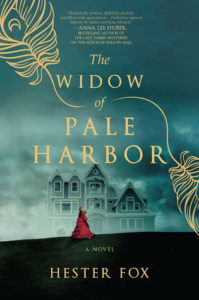 Title:
Title: 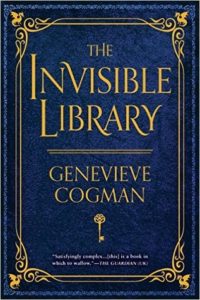 Title:
Title: 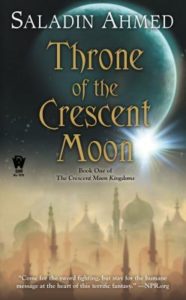 Title:
Title: 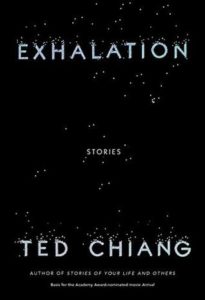 Title:
Title: 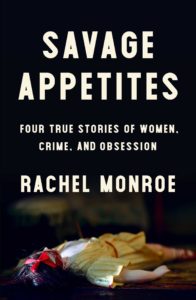 Title:
Title: 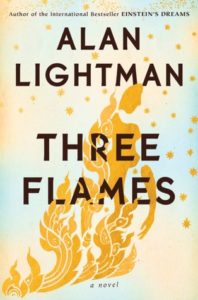 Title:
Title: